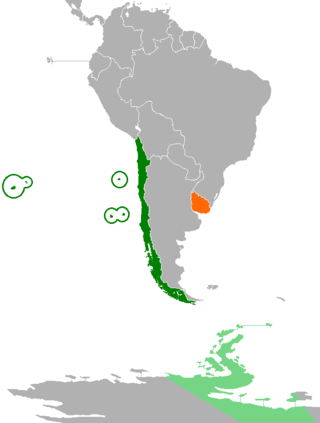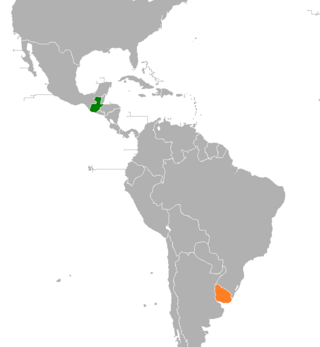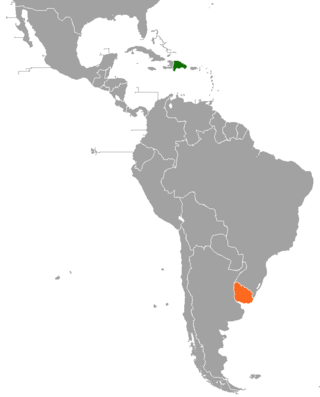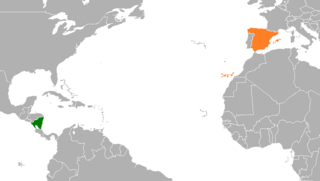
Foreign relations exist between Armenia and Uruguay. Uruguay, as a small South American nations hosts a large Armenian community for its size. The Armenian community in Uruguay totals approximately 16,000 people.

The nations of Mexico and Uruguay established diplomatic relations in 1831. Both nations are members of the Community of Latin American and Caribbean States, Latin American Integration Association, Organization of American States, Organization of Ibero-American States and the United Nations.

Peru–Uruguay relations are the diplomatic relations between the Republic of Peru and the Oriental Republic of Uruguay. Both nations are members of the Cairns Group, Community of Latin American and Caribbean States, Group of 77, Latin American Integration Association, Organization of American States, Organization of Ibero-American States and the United Nations.

Chile–Uruguay relations are the current and historical relations between the Republic of Chile and the Oriental Republic of Uruguay. Both nations are members of the Cairns Group, Community of Latin American and Caribbean States, Group of 77, Latin American Integration Association, Organization of American States, Organization of Ibero-American States and the United Nations.

Bolivia–Uruguay relations refers to the diplomatic relations between the Plurinational State of Bolivia and the Oriental Republic of Uruguay. Both nations are members of the Cairns Group, Community of Latin American and Caribbean States, Group of 77, Latin American Integration Association, Organization of American States, Organization of Ibero-American States and the United Nations.

Colombia–Uruguay relations refers to the diplomatic relations between the Republic of Colombia and the Oriental Republic of Uruguay. Both nations are members of the Cairns Group, Community of Latin American and Caribbean States, Group of 77, Latin American Integration Association, Organization of American States, Organization of Ibero-American States and the United Nations.

Cuba–Uruguay relations refers to the diplomatic relations between the Republic of Cuba and the Oriental Republic of Uruguay. Both nations are members of the Community of Latin American and Caribbean States, Group of 77, Organization of Ibero-American States and the United Nations.

Costa Rica–Uruguay relations refers to the diplomatic relations between Costa Rica and Uruguay. Both nations are members of the Community of Latin American and Caribbean States, Group of 77, Organization of American States, Organization of Ibero-American States and the United Nations.

El Salvador and Uruguay share a common history in the fact that both nations were once part of the Spanish Empire. Formal diplomatic relations were established in 1929. Both nations are members of the Community of Latin American and Caribbean States, Group of 77, Organization of American States, Organization of Ibero-American States and the United Nations.

Portugal–Uruguay relations refers to the current and historical relations between Portugal and Uruguay. Both nations are members of the Organization of Ibero-American States and the United Nations.

Guatemala and Uruguay have long-standing diplomatic relations. Both nations are members of the Community of Latin American and Caribbean States, Group of 77, Organization of American States, Organization of Ibero-American States and the United Nations.

Dominican Republic–Uruguay relations refers to the diplomatic relations between the Dominican Republic and the Oriental Republic of Uruguay. Both nations are members of the Community of Latin American and Caribbean States, Group of 77, Organization of American States, Organization of Ibero-American States and the United Nations.

The Republic of Honduras and the Oriental Republic of Uruguay have long-standing bilateral and historical relations. Both nations are members of the Community of Latin American and Caribbean States, Group of 77, Organization of American States, Organization of Ibero-American States and the United Nations.

The nations of El Salvador and Mexico established diplomatic relations in 1838. Both nations are members of the Association of Caribbean States, Community of Latin American and Caribbean States, Organization of American States, Organization of Ibero-American States and the United Nations.

The nations of Honduras and Mexico established diplomatic relations in 1879. Both nations are members of the Association of Caribbean States, Community of Latin American and Caribbean States, Organization of American States, Organization of Ibero-American States and the United Nations.

The nations of Mexico and Nicaragua established diplomatic relations in 1839, however, relations were briefly severed in May 1979 and restored a few months later in July 1979 with the ousting of Nicaraguan President Anastasio Somoza Debayle. Diplomatic relations between both nations have continued unabated since.

The nations of Costa Rica and Mexico established diplomatic relations 1838. Both nations are members of the Association of Caribbean States, Community of Latin American and Caribbean States, Organization of American States, Organization of Ibero-American States and the United Nations.

El Salvador and Spain have long-standing cultural and diplomatic relations, owing to the history of the Spanish Empire. Bilateral relations between the two as sovereign states began in 1865. Both nations are members of the Association of Academies of the Spanish Language, Organization of Ibero-American States and the United Nations.

Costa Rica–Spain relations are the diplomatic relations between Costa Rica and Spain. Both nations are members of the Association of Academies of the Spanish Language and the Organization of Ibero-American States.

Nicaragua–Spain relations are the diplomatic relations between Nicaragua and Spain. Both nations are members of the Association of Academies of the Spanish Language and the Organization of Ibero-American States.






















